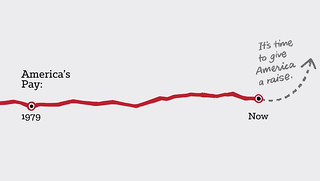Search News
For the Media
For media inquiries, call CWA Communications at 202-434-1168 or email comms@cwa-union.org. To read about CWA Members, Leadership or Industries, visit our About page.
A Democracy Movement to Shake the Country
CWA President Larry Cohen this week called for a new democracy movement in America to reclaim for workers and the general public power that has been taken from them in poorly negotiated trade deals.
Cohen made his remarks as the featured speaker at a conference called by the Economic Policy Institute to find solutions to jumpstart Americans' stagnant wages. He also introduced U.S. Labor Secretary Thomas E. Perez, who gave the keynote speech at the program, which was attended by EPI economists and activists working to raise wages for workers nationwide.
Click here to watch President Cohen speak at the EPI event.
"It is not going to matter one bit what our policy ideas are if we don't build a democracy movement in this country," he said. "We've got a great policy agenda. We have no power to enact it. It isn't just that working people cannot organize on the job, it is that this democracy is literally in the trash can. But we keep pretending that it is not, that the next election is going to reinvent it."
EPI issued a report showing wage growth for most American workers has been stagnant for the past three-and-half decades.

Cohen zeroed in on the continuing erosion of bargaining rights for U.S. workers – even as workers in some places such as Brazil have made great strides – as the main reason for the stagnation and proposed attacking the problem by changing the political culture in the country.
Workers in many European nations, he said, have universal collective bargaining rights. Telecommunications workers in Germany, for instance, have bargained contracts that increased wages to 3% above inflation. And that's not counting that U.S. workers have to pay for health care. German workers don't.
He pointed out that $7 billion was spent in the campaign for federal offices in 2012, a 500% increase in 12 years; and that in the United States Senate, it takes at least 60 votes to get anything done. And there's the erosion in voting rights, which he says is worse than when the Voting Rights Act was passed in 1965. Meanwhile, 20 million immigrants, half of whom have Green Cards, are denied a path to citizenship and could not participate fully in our nation's economic life. Moneyed interests have undue sway over U.S. trade policies, negotiating deals that favor multinational corporations and strip power from workers.
CWA is one of the founding organizations of the Democracy Initiative that is determined to overcome the barriers to democracy by organizing around these three goals: getting big money out of politics, voting rights and reforming the broken Senate rules.
"So, it's not hopeless," Cohen says. "It's just the hardest it's ever been."
Multinational corporations won't raise wages and won't keep jobs in America, no matter how much profit they make, if they don't have to, he said.
"The CEO of one of these companies said to me, 'it's like gravity. We are taking the job to the lowest cost place we can produce it unless there's policy to stop us,'" Cohen said. "We are not going to have policy to stop it, whether it's trade policy or labor policy, unless we have a mass movement with a political dimension and take the money out of politics so we don't have the most expensive and the worst elections in the world."
After World War II, 10 million Americans belonged to unions. That number would grow to three times that size as America created a middle class that was the envy of the world. And the reasons for the growth, Cohen said, weren't just workers organizing or just political change or unprecedented levels of community organizing.
"We so often get confused between the policy that's in our head – why didn't somebody come up with this idea? – and the democracy movement that we need to get adopted."